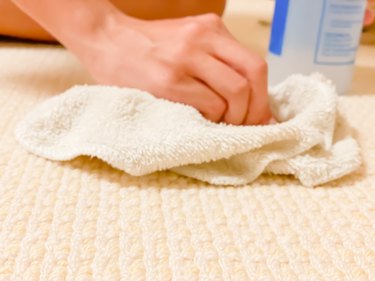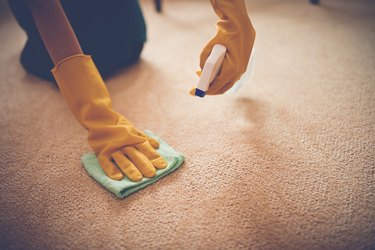
Even when you prep a room before painting and are careful as can be, paint drops and splatters still make their way onto carpets. Sometimes you see it right away, and other times the stains are not found until much later on. The method for removing them from the carpet fabric depends on the type of paint you have used, so keep this in mind before you start the stain removal process.
Removing Gloss Paint From Your Carpet
Video of the Day
Gloss paints are oil-based; they also contain resins, so they are among the most difficult to remove. Fresh gloss stains come out easier of course, so as soon as you see one, blot away as much as you can with a paper towel, being careful not to rub it into the carpet fibers.
Video of the Day
Then, get a thinning solvent like acetone or turpentine, but test it on a hidden part of the carpet first with a cotton ball. If the test part doesn't discolor, dip a clean cloth into the thinner and work from the outside of the stain to the inside. Mineral spirits (also called white spirits) have also been known to remove many oil-based stains from a carpet but again – be sure to test it in a less visible location first.
Removing Dried Gloss Stain

If the gloss stain has already dried on the carpet, try using a blunt knife to break up the paint and remove the pieces first. You can also try using a handheld steamer to soften the paint for easier removal. After most of the paint is lifted out from your carpet, mix a few drops of dish detergent into warm water. Work this into the remaining stain carefully with a cloth or soft brush. Blot out any remaining cleaning product with a sponge and clean water, but do not oversaturate the area; dry it with a hair dryer or a fan and then vacuum.
Removing Acrylic Paint From Your Carpet
Most kinds of acrylic paints are water-based, dry quickly and are then water-resistant. For these, also blot away as much as possible if the stain is fresh. Cleanup Home recommends using a citrus cleaner or a putty knife to scrape away dried stains; be sure not to pull too hard at the fibers. You can also use a vacuum hose attachment to pull up any rogue paint chunks.
As an alternative to these cleaning methods, try mixing one part white vinegar with 10 parts of water in a bucket. Dip in a clean sponge and blot away at the acrylic paint stain. You can also try dropping in one teaspoon of dish liquid into a cup of warm water and use this in the same fashion. This is a less invasive method, so you may have to use something stronger for more stubborn stains.

Blot the stain with a dry cloth that has been soaked (and then wrung out) with rubbing alcohol or acetone. Let this sit on the stain for 20 minutes or so, remove and blot at the stain with a clean cloth. If you have a steam vacuum attachment, this would very useful at this point. You can also dip a cloth in glycerin, which can be used in the same way as the alcohol or acetone.